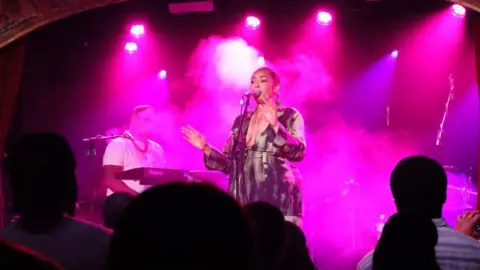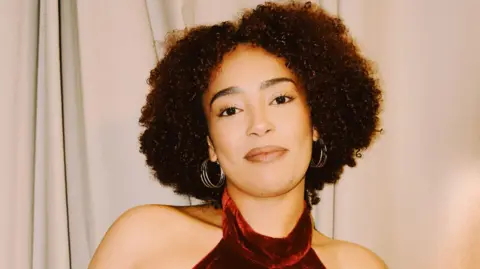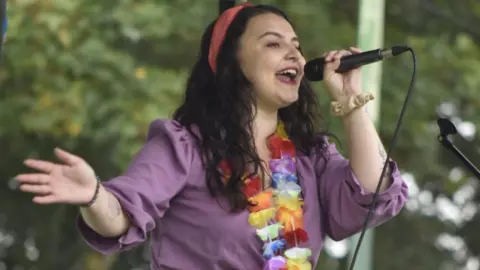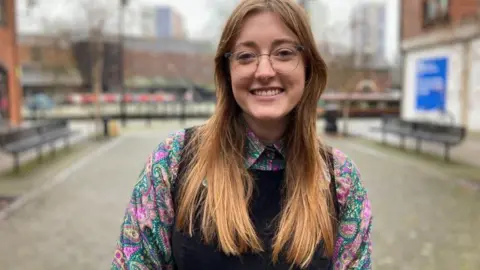'People forget - musicians are human too'
 Kingpin @djkingpin33
Kingpin @djkingpin33Singer Madi Saskia has been recording music and performing at venues across the UK since she was about 16 years old.
The R&B and soul artist from Smethwick, near Birmingham, was soon put forward for a music programme which culminated in a performance at the iconic Koko concert venue in Camden, London.
Ten years later, she is one of thousands of grassroots, professional musicians struggling to weather the storm of the cost-of-living crisis. And she thinks their plight has been overlooked.
"Everyone is human and I sometimes think people forget musicians are human as well - we are people too with bills to pay," she said.
While the absence of consistent pay has long been a concern for the performer and others like her, rising living costs have exacerbated the issue. Maintaining equipment, booking rehearsal space and covering travel costs has become more expensive for artists, while venues and gig-goers alike are tightening their budgets as they feel the squeeze.
For Ms Saskia, who relies solely on her music income, the rates she gets paid no longer add up.
She will often travel to and from a performance to find she used up the night's income to pay for that journey.
"Sometimes you'll only get paid what your phone bill is and then sometimes it will only cover your travel and your food," she said.
"Once I've fed myself and travelled back home, I still have to think about how I'm going to put money towards rent and bills."
 Jamie Drew @jdshotyou
Jamie Drew @jdshotyouKelley Phillips sings as Kelley Tigerheart at pubs, clubs and events within 50 miles of her home in Nantwich, Cheshire.
She also teaches dancing twice a week and has picked up a part-time job to supplement her income.
That, she said, had "increased my time working, which has given me less leisure time".
"[But] I have had no other choice as a single woman living alone but to get other jobs."
 Kelley Tigerheart
Kelley TigerheartMs Phillips said things had "slowed down" over the past year due to pubs being more careful with their budgets, causing her to negotiate more and offer discounts.
But she said she would never give up performing and advised others looking to enter the industry to plan and budget meticulously.
"I always encourage people to go for their passions and do what they love," she said.

Jess Harper, marketing manager at Coventry venue The Tin, described grassroots venues as "incredibly essential" to budding artists.
But it is not easy for these premises. "Lots of venues are facing rent increases, price increases everywhere. It's a struggle for a lot of venues," Ms Harper explained.
The venue is raising money to refurbish the front of the building with more than £6,000 donated so far. Ms Harper said the venue was lucky to have so much support from regulars.
Asked how vital The Tin was to the city, she said: "It's really important, we would not get the bigger artists we have with these grassroots music venues."
She said initiatives like the Music Venue Trust's proposal for a £1 levy on arenas could help smaller venues with rising costs.
'Art needs to be respected'
According to the Help Musicians charity, 44% of the 6,000 people interviewed for its 2023 Musicians' Census cited the lack of a sustainable income as a barrier to their career.
Meanwhile, 23% of musicians said they were unable to support themselves or their families, while venues tightened budgets.
This has contributed to a third of artists reporting low mental wellbeing, according to the charity.
But its director of services and research Laurie Oliva said musicians were "resilient", as 81% reported they would still be in the industry in five years.
"As fans, it's important we support artists where we can by buying tickets and merch, going to shows, and subscribing to initiatives," she added.
In the meantime, Ms Saskia says more investment is needed in infrastructure to secure the future of the arts.
She believes the arts are among the most "disrespected" subjects on the curriculum in schools, and says attitudes need to change to encourage more young people into artistic industries.
"Music is the backdrop for every memory. You can attach music to a person, a feeling, it can help you heal, it can help you get through your bad times and good days," she said.
"A world void of sound is a world void of colour and feeling… sound needs to be respected."
Follow BBC Birmingham on BBC Sounds, Facebook, X and Instagram.
